- Home
- Pat Conroy
A Lowcountry Heart: Reflections on a Writing Life Page 3
A Lowcountry Heart: Reflections on a Writing Life Read online
Page 3
After they burned the cross, I went to the telephone booth and called Sheriff Wallace to tell him that neither Penn Center nor the Siceloffs were mentioned, and everyone seemed to be going home.
“What was the meeting for?”
Sheriff Wallace laughed when I said, “The Klan doesn’t seem to like black people very much.”
So I came to Penn Center fifty years ago, and Penn Center does me high honor tonight. Penn Center led me by the hand to a destiny that made me a teacher, that made me become a teacher of Afro-American history, the first such course taught in a formerly white high school in South Carolina. When a job opened up on an isolated Daufuskie Island, I asked for the job because I wanted to be part of history. I knew I’d be the first white man ever to teach black children in that portion of the world and I thought I’d be doing God’s work. I did God’s work with eighteen of his sweetest children.
An official from the school district visited my school at Daufuskie after I’d been there for a month. After strolling through my class, this man commented, “Too bad they’re all retards.”
“Come back in a month. I’ll have a surprise for you. And don’t ever call my kids that again.”
He returned with four people from the county office the next month. Me and my kids were ready and waiting. My mother had given me one of her cheapo birthday presents that had the fifty greatest classical hits on it—everyone from Beethoven to Handel. Each day, I’d play that record at the end of school.
“Okay, kids, this is Beethoven’s Fifth Symphony. Raise your hands when you hear death knocking at the door. Fall asleep when you hear Brahms’s lullaby. Run for your life, Rimsky-Korsakov’s Flight of the Bumblebee’s on the way.”
When those school officials walked into that room, a woman supervisor said that the music I was playing was inappropriate for children this young.
“Sallie Ann,” I said to my introductress in the sixth grade, “this nice lady thinks that music is inappropriate.”
“Perhaps she’d rather listen to Rimsky-Korsakov,” Sallie Ann said. “Or perhaps Tchaikovsky.”
I went straight through the fifty top classical hits and my kids nailed every one of them. The five officials left stunned, and were angry when I offered to test them in front of the kids.
“Most inappropriate,” the same woman said.
“That’s because none of you know the music.”
Last night, my old friend John Gadsen remembered the days of my youth when I was a hothead. I do not think I was a hothead—not then and not now. I thought I was right. I had read the Declaration of Independence, the Constitution, and the Bible. Segregation seemed evil from the time I was a boy. Slavery is an abomination on the American soul, an ineradicable stain on our body politic. But Penn Center lit a fire that has never gone out, and the election of President Barack Obama was one of the happiest days of my life.
You know how my story as a teacher ended. The white boys rose up and got rid of this hotheaded white boy. I never taught again. The white boys won, or so they thought. That superintendent and that school board drove me out of a job and eventually out of Beaufort. But to you, the people of Penn Center, whose ancestors survived the grueling Middle Passage and the heat of cotton fields and the whips of overseers—rejoice with me. I’m living proof that Penn Center can change a white boy’s life. You changed me utterly and I’m forever grateful to you. Yes, I was fired, humiliated, and run out of town because I believed what Martin Luther King believed. Yes, they got me good, Penn Center, but on this joyous night, let me brag to you at last: Didn’t I get those sorry sons of bitches back?
Thank you very much…
On the Future of Books
OCTOBER 2010
Hey, out there,
About the war between me and technology: it appears that technology is rolling over me like a blitzkrieg. I’m a victim of all its barbarisms. I still can’t type, which makes my e-mails seem composed by a highlands baboon. Once or twice a week, I check my e-mail, whether I need to or not. I understand that most human beings check theirs with more frequency. Twitter is an unknown factor in my life and I’ve never seen Facebook, even though I’m told I have a presence on both of these entities. People give me looks of pity and ask me why I want to wallow in my disconnection from a very connected world. It is simple. The world seems way too connected to me now. It seems to be ruining the lives of teenagers and bringing out the bestial cruelty in those who can hide their vileness under the mask of some idiotic pseudonym. I like to sit alone and think about things. Solitude is as precious as coin silver and it takes labor to attain it. I can be frivolous without Twitter and Facebook. I turned sixty-five this year and I take old age seriously. There’s work to be done.
Oh, by the way, I don’t own a Kindle or an iPad or one of those fancy cell phones where I can type up a novel or read The New York Times or build a boat in my living room. My younger friends tell me that Kindle is an absolutely revolutionary invention, and I’ll admit that the thought of downloading Anna Karenina and reading it on a cross-country flight is astonishing to me. Even so, I’ll remain a book guy because I own eight thousand of them and I love the way they make my house look. The publishing world seems to have been caught flat-footed by the sheer brilliance of this assault, and we’ve come to a point where the future of books is at stake. What remains certain is that any writer in the world can now get a book published without the help of agents, editors, or even a publishing house. I encourage every unpublished writer to do just that. Then, I would get fifteen real books in hardback from Books on Demand to give myself, friends, and family. My first book, The Boo, was published by McClure Press in Virginia, and my mother gave me a launch party at her house on East Street in Beaufort. I remember The Boo himself giving me the presentation copy of the book and signing it. Just now, I looked at what he signed and it moved me greatly. “To the lamb that made me. The Boo.” I know much about the pleasures of publishing your own book.
Great love…
My Spooky Life
JANUARY 2011
Hey, out there,
When I used to keep journals on a fairly regular basis, I thought I was reporting on my own spooky, invisible interior life. This letter—or blog—has the same feel to it, and I find it a great warm-up for a day at the writing table. After a month of traveling and running my mouth (is there anyone on earth sicker of the sound of his own voice than me?), I’ve returned to work on the book called The Death of Santini. I’ve written more about my parents than any writer in the history of the world, and I still return to their mysterious effigies as I try to figure out what it all means—some kind of annunciation or maybe even a summing-up. They still exert immense control over me even though they’ve been dead for so long. But I can conjure up their images without exerting a thimbleful of effort. Both of them act like lawyers on call, and they seem to take pleasure in their daily visits to plead their cases before their seven children.
I was on the phone with my brother Jim the other night when he tossed me this little circle of gold from our past. Jim is a hotshot salesman who works for Ruiz Foods, based in Dinuba, California. He is called the “dark one” in the family, and it is a sobriquet well earned, although there are mother lodes of darkness in each one of us. Jim told me about the last time he visited our grandmother Stanny in her last years in assisted living in Orlando. Jim’s work brought him to the area every six months. Toward the end, Stanny got dementia and she never recognized Jim when he came to see her. The last time he saw her, Jim entered Stanny’s room and gave her a kiss on the cheek as she sat in her wheelchair.
“Hello, young man,” she said. “I don’t believe I know you, do I?”
“Yes, you do, Stanny,” Jim replied.
“Could you explain how?”
“I’d be happy to, Stanny. I’m your grandson Jim. I’m the fifth child of your daughter, Peg Conroy. My father is Don Conroy.”
“Oh, no. That couldn’t be true,” Stanny said.
“It’
s true,” Jim told her. “I’m the fifth child of Peg and Don Conroy. Remember, Pat’s the oldest? Then there is Carol, Mike, and Kathy. I came right after them. Tim and Tom were your last grandchildren born in that family.”
“No, that just can’t be true,” Stanny argued.
“Why not?” Jim asked, puzzled.
“Because my daughter Peggy was a very beautiful woman. Her husband, Don, was a very handsome man.”
“That’s true, but I still don’t get it.”
Stanny looked hard at Jim and said, “You are a very ugly young man. You could not possibly be their son.”
As Jim told the story I waited for the “dark one” to emerge. He did when he told our grandmother, “Hey, Stanny. Have you looked in the mirror lately?”
Jim reported that both he and Stanny laughed so hard that he thought they would cry. Humor has always been the redemptive angel in the Conroys’ sad history. With this family, I shall never grow hungry from lack of material.
Great love…
My Blogging Life
AUGUST 2, 2011
Hey, out there,
I’ve published two books since I first wrote a letter of introduction to my newly hatched website. For me, this is a starting-out point caused mostly by the passage of time and the possibility of my sudden or protracted death. Now, I’m halfway through a new book I’m calling The Death of Santini, in which I tell of my father’s miraculous turnaround after he retired from the Marine Corps. He loathed my depiction of him in The Great Santini, and he set out to prove me wrong by turning himself into something that was recognizably human. It’s the great surprise of my life that I ended up loving him so much. My brothers and sister Kathy are unloading their stories about Mom and Dad to me, and we all suffered in the house of Santini. My siblings do not all share my exalted affection for our mother, and I have not been shy about sharing their dissent. This causes me pain, but I’ve been writing about these two mismatched people for my whole life, so I need to get to some kind of conclusion about them, one that feels like the truth at last.
My sister Carol Ann remains a stranger to my life. I only see her at weddings and funerals—all of which she turns into personal nightmares for me—as you will one day read about. My sisters-in-law are so hysterical at the thought of reading about themselves and their poor, traumatized husbands that they have been treating me with far more kindness and respect than they could ever muster in the past. I tell them that they have nothing to worry about, but they know that I’ve lied before. (That’s a joke, girls.)
In the late nineties I was diagnosed with an incurable neurological disorder known as “writer’s cramp.” Though I laughed out loud when the doctor gave me this diagnosis, the humor of it faded in short order. It’s the same disease that Henry James developed, and it sent him to a recording device to speak his novels into a machine and have them transcribed. In my opinion this did not help the later novels much, and I can’t pick up The Golden Bowl or The Princess Casamassima without choking on the runaway elaborations of his spoken novelistic voice.
So I did not buy a tape recorder or invest in a computer that operates by voice recognition, as the supremely gifted writer Richard Powers did. Instead, I did wrist exercises and managed to write on my “good days,” read on the bad ones. The main thing that changed was that I rarely wrote in my journals at all. I could not afford to sacrifice my writing life to the luxury of journal keeping when there were more novels to write. I checked out the blog world, “blog” being the ugliest word to emerge out of the “wired” universe so far. But, I thought, I’ve got this website that I barely use, and it’s being watched over by a baleful webmaster, Mihai (Michael) Radulescu, who hails from Romania where Vlad the Impaler and Count Dracula once left their marks. I’ll make an effort to keep this journal until I decide to abandon it and return happily to my unjournaled life.
Great love…
The Boo’s Lambs Gather in Charleston
NOVEMBER 6, 2011
Hey, out there,
My classmates in Romeo Company at The Citadel are beginning to stir and gather. As the country paused to remember the firing on Fort Sumter, it made me remember that I went to the college whose cadets fired the first shots in the Civil War and that two of my classmates in R Company were named for Southern generals—Stonewall Jackson Watson and Wade Hampton Williford III.
I spoke at the Citadel library last month, at an event honoring the publication of my friend John Warley’s new novel called Bethesda’s Child. John and I roomed together on the Citadel baseball team and have been lifelong friends ever since those faraway days. I wrote a thirteen-page introduction to his book, and it reminded me of our times on that wonderful team with road trips through the South which still remain legendary to me and John. He and I are going to be doing a talk together next year at the Savannah Book Festival. John and his wife, Barbara, are our neighbors now that Cassandra and I have moved into Beaufort. We have lunch on a weekly basis to reminisce about our time at The Citadel together.
After the talk at The Citadel, John and I went out to a restaurant bar on Queen Street with three of my classmates from Romeo Company. Unfortunately, John Warley was a slovenly, uncouth member of Tango Company, the tallest company at the college, but also the dumbest and least military. My R Company guys griped all evening that I had loused up the experience by bringing along a “waste from Tango,” but John is silver-tongued and quick, and he more than held his own. The horror of all Citadel wives is to put up with their husbands and their classmates telling Citadel stories that they’ve heard a thousand times before. I admit, there is some repetition at play.
I’d never met Robbie Schear’s wife before, though I knew of her when they dated at The Citadel. Nancy Miller was selected “Miss Citadel” for our senior year and remains a stunning woman today. Stonewall Jackson Watson brought his delightful daughter, Meg, who has a lot better personality than her father ever did.
We talked of many things that night, ranging from Hell Night to members of the R Company cache we still hated with all the powers of abhorrence we could summon. But someone mentioned The Boo and I realized I had never stopped grieving over The Boo’s death. For those readers who don’t know, The Boo was Lieutenant Colonel Thomas Nugent Courvoisie, the assistant commandant of cadets at The Citadel and the subject of my first book, The Boo. I often tell people The Boo is “the worst book ever written by an American,” and I wish I’d written it better. But the evening made me think a lot about The Boo, who is buried near my parents in the Beaufort National Cemetery. I was scared of him at The Citadel, but he was a source of humanity and justice, and the most beloved man on campus during his brief time among the cadets. I went looking for the presentation copy of The Boo he had given me in 1970. I had never opened it that I could remember, and I wanted to see if he had signed it. When I opened it, I found these eight words written to me forty-one years ago: “To the lamb who made me, The Boo.” These words made my whole writing career worthwhile.
And I have begun thinking of that life as miraculous and lucky. How could a man I had dreaded as my commandant and who tried twice to get me kicked out of college become the subject of the first book I would write? How could the young kid I was then become one of the closest friends The Boo would ever make? Who could have predicted that The Boo would be hired as the mighty advisor for the filming of The Lords of Discipline in England? After his long humiliation and exile by The Citadel, who would have predicted that he and I would both be honored by a full-dress parade and honorary degrees as we stood shoulder-to-shoulder on the same parade ground we had marched on as boys? Who could have foreseen the day I would deliver his eulogy at the Summerall Chapel, or that I would give a speech on the night they named the dining room in the new Alumni Hall after him? Not me. Not once. Not ever.
I thought you might like to read the speech I gave when they dedicated “The Boo’s room.” It was a great night, and The Boo’s lambs have always been rowdy, loud, and attracted to the wild side.<
br />
There is one great story about The Boo that has never been told, and I waited for a night like this to tell it. In 1969, The Boo was removed from his position as the assistant commandant of cadets in charge of discipline and sent in exile to The Citadel warehouse, where he spent the rest of his career in charge of cadet luggage and supplying the entire campus with custodial material and toilet paper. He was given a direct order that he was to have nothing to do with Citadel cadets except those who had business at the warehouse. Always the good soldier, The Boo did as he was told and his personal contact with cadets before he retired in 1982 was minimal. In those years, The Citadel learned it could hide the growing legend of The Boo, but could not bury it. The Citadel found out that it could not hide what the Corps revered; it could not sweep under the rug what the Corps deeply loved. The Boo had proven he could love a whole Corps of Cadets like no man who ever put on a Citadel ring. It came time for the Corps to pay him back.
In 1973, The Boo had a heart attack that almost killed him. I drove down from Atlanta to visit him at the naval hospital, and he did not look that day like a man who would survive to see the dedication of the Courvoisie Room in September of 2001. When I left to return to Atlanta the next day, Elizabeth Courvoisie wept at my departure and told me she did not ever think I would see her husband again. Two weeks later, he returned to his quarters in the Citadel campus, bedridden and despondent. For a month, he did not leave his house. Only a few cadets came to visit him because The Boo had become invisible to the Corps of Cadets, or so The Citadel thought. So The Boo thought.
Nothing on earth thinks or moves or acts or responds like The Citadel Corps of Cadets. The Corps of Cadets is a sovereign nation unto itself, a country that fashions its own rules, a strange entity that makes up its own mind in its own good time. The Citadel thought the Corps of Cadets had forgotten the legend of The Boo. But it was the Corps who made that legend and the Corps who would keep it alive.

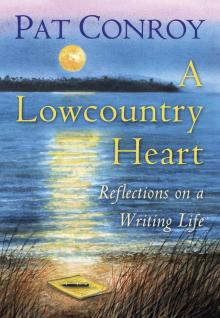 A Lowcountry Heart: Reflections on a Writing Life
A Lowcountry Heart: Reflections on a Writing Life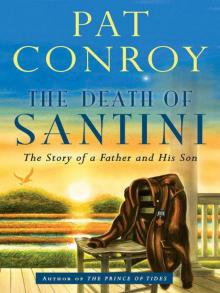 The Death of Santini: The Story of a Father and His Son
The Death of Santini: The Story of a Father and His Son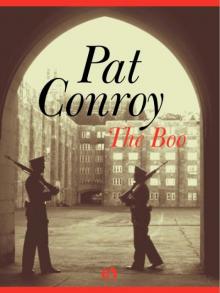 The Boo
The Boo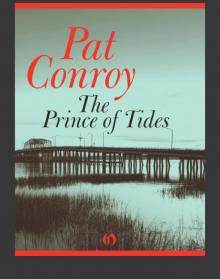 The Prince of Tides
The Prince of Tides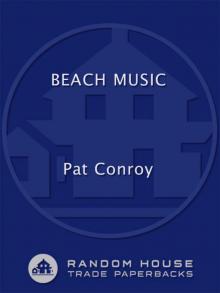 Beach Music
Beach Music The Water Is Wide
The Water Is Wide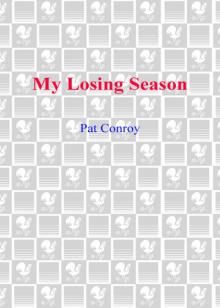 My Losing Season
My Losing Season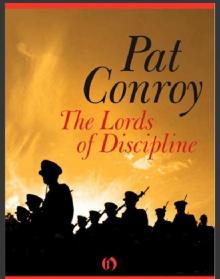 The Lords of Discipline
The Lords of Discipline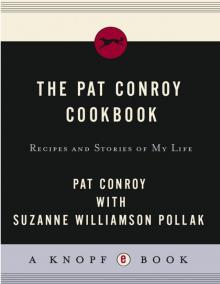 Pat Conroy Cookbook
Pat Conroy Cookbook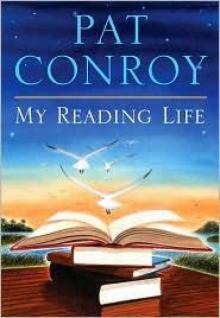 My Reading Life
My Reading Life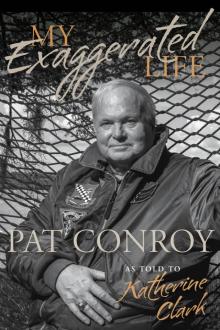 My Exaggerated Life
My Exaggerated Life The Pat Conroy Cookbook
The Pat Conroy Cookbook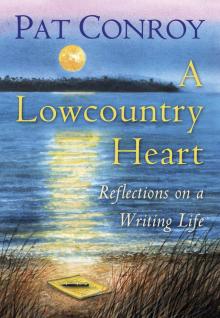 A Lowcountry Heart
A Lowcountry Heart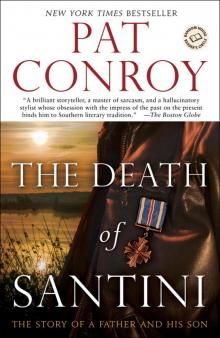 The Death of Santini
The Death of Santini